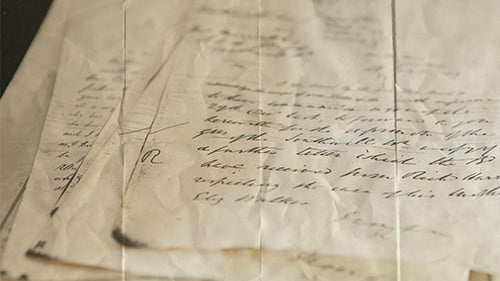Bringing Primary Sources to Life: Engaging Ways to Teach Documents Beyond Close Reading
Primary sources provide students with a personal window into the past, enabling them to view history as human stories rather than a list of facts....
AP & Honors Mathematics
Explore Wiley titles to support both AP and Honors mathematics instruction.
Literacy Skills & Intensive Reading
Connections: Reading – Grades 6–12
Empower student success with a proven intensive reading program that develops strong reading skills in striving readers.
Drama, Speech & Debate
Basic Drama Projects 10th Edition
Build students’ confidence and competence with comprehensive, project-based theatre instruction.
Literature
Connections: Literature
Support learners as they study dynamic, relevant texts and bring the richness of diverse voices to students through literature.
Literature & Thought
Develop critical thinking, reading, and writing across literacy themes, genres, historical eras, and current events.
Language Arts
Vocabu-Lit® – Grades 6–12
Help students build word power using high-quality contemporary and classic literature, nonfiction, essays, and more.
Connections: Writing & Language
Help students develop grammar, usage, mechanics, vocabulary, spelling, and writing and editing skills.
Reading/English Language Arts
Measuring Up to the English Language Arts Standards
Incorporate standards-driven teaching strategies to complement your ELA curriculum.
English Language Learners
Measuring Up for English Language Learners
Incorporate research-based best practices for ELLs with an approach that includes a focus on language acquisition strategies.
Mathematics
Measuring Up to the Mathematics Standards
Incorporate standards-driven teaching strategies to complement your mathematics curriculum.
Foundations
Measuring Up Foundations
Help students master foundational math skills that are critical for students to find academic success.
Science
Measuring Up to the Next Generation Science Standards
Give students comprehensive NGSS coverage while targeting instruction and providing rigorous standards practice.
Assessment
Measuring Up Live
Deliver innovative assessment and practice technology designed to offer data-driven instructional support.
For a better website experience, please confirm you are in:

Early in a school year it can be a real challenge to know how to begin teaching students critical skills they need to score on the AP® U.S. History Exam. I don’t think there is any one right way to begin approaching exam skills with our students, but, personally, I like to begin with something that is small and manageable but will also develop skills that students will use in various situations in class and on the exam. For me, the ideal place to begin is with Short Answer Questions (SAQs).
I like to start with SAQs because, by doing so, I am helping students develop skills that they will use in ALL other portions of the APUSH Exam. Working with the SAQs will help students in their thesis writing (DBQ and LEQ), their document sourcing (DBQ), and document analysis (MCQ and DBQ).
This all can happen by using the acronym C-E-E for teaching students to answer SAQ questions. All SAQs have three parts (labeled A, B, and C), and students must answer each part of the question. Teaching students to use the C-E-E method for writing their response to each part of the question will not only help them score on the SAQs, but also develop skills for other key areas of the APUSH Exam.
C-E-E stands for:
One way to help students develop their SAQ would be to use an SAQ organizer. This will help students be certain they are drafting a complete response to each portion of the SAQ. Using an organizer as scaffolding will move students more quickly to success. After using this organizer a few times, we can move away from its use. But repetitive SAQ practice is key to student development. SAQs can be found on the College Board AP® Classroom site and in APUSH Exam review books, such as the Advanced Placement® United States History coursebook from AMSCO®. Having students write one or two SAQs every week will give them the practice they need to both be successful SAQ writers, and to be prepared for other portions of the APUSH Exam.
If we start small, with the SAQ, we are more likely to finish strong, with improved student performance on all portions of the APUSH Exam in May. The SAQ is a great place to begin the APUSH journey.
Jay Henry has been teaching AP US History in Coldwater, Michigan, for over 20 years. He has also also been a history instructor at Kellogg Community College in Michigan. Jay was a Barringer Research Fellow in 2019 at the Monticello Teacher Institute and developed a Document Based Question regarding Thomas Jefferson and the Enlightenment to help students learn to write a DBQ by scaffolding their writing. He graduated with a B.A. from Kalamazoo College, Michigan, and a M.A.T. from the American University in Washington, DC.

Primary sources provide students with a personal window into the past, enabling them to view history as human stories rather than a list of facts....

Many teachers consider the Document Based Question (DBQ) of the AP® European History Exam to be one of the more challenging aspects of the course....

You may have heard about the “Irish” Thesis Formula—it is all over the internet. Some teachers like it, others hate it, but whatever you think about...

One of the things that I spent most of my time thinking about, when the redesigned AP U.S. History course went into effect, was how to deal with the...

Each year after the AP® exam I ask students to evaluate my class. Last year, they overwhelmingly identified that they wanted to work on FRQs more...

As the AP® exam draws near, students often become increasingly anxious. Review games and activities can target areas students need to review while...

From a practical point of view, argumentation is at the heart of the free response section of the AP exam. This can be particularly difficult with...

Join AP experts Brandon Abdon, Colin Baker, and Bob Topping to discover scaffolded approaches to teaching the APUSH, AP Euro, and AP World History...

The Long Essay Question (LEQ) on the AP U.S. History exam offers students an opportunity to construct a sophisticated historical argument, supported...

In a 2004 Gallup survey, history and social studies ranked as the least popular subject for teenagers. Why is this? Many adults recount history class...

We are just weeks away from the AP® Human Geography Exam—wow! As teachers we are nervous, anxious, and hoping that we have done everything we can to...

The teaching of AP® World History can be a daunting task at times. Teachers are asked to teach over 800 years of historical content and then develop...
